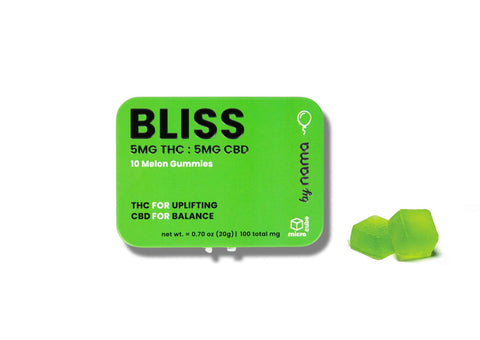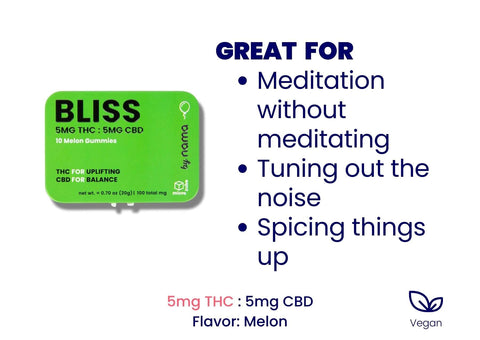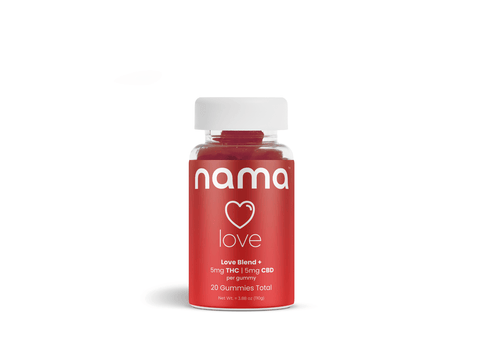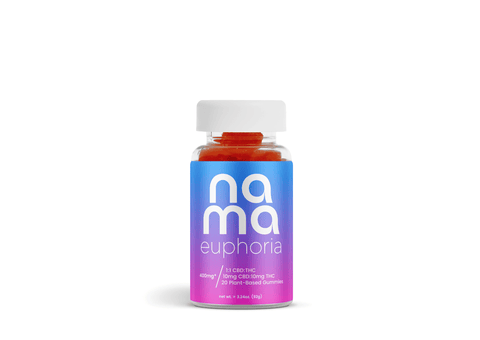
Low doses of cannabis might be the next big thing in the fight against thyroid cancer. Researchers at the Thomas Jefferson Hospital show that THC and CBD induce cancer cell death, inhibit tumor blood vessel growth, and block molecular pathways that drive thyroid tumor progression.
Hanganu, et. al. (2022) demonstrated that cannabis also increases sensitivity to chemotherapy. THC and CBD activate the endocannabinoid system (ECS) to cause paclitaxel, a chemotherapy drug, to induce twice as much cancer cell death in the thyroid cancer cells.
If you are battling thyroid cancer and want to give cannabis a go, our all-natural THC edibles offer a safe, convenient, and delicious way to do so. Ditch smoking and vaping and discover the benefits of microdosing cannabis with gummies and drinks.


THC: 10 mg | CBC: 10 mg | CBD: 10 mg | CBG: 5 mg | CBN 5mg
Understanding thyroid cancer
Thyroid cancer starts in the thyroid gland, an endocrine gland located at the base of the neck.
It is made up of two main types of cells: follicular cells and C-cells. Thyroid cancer begins when the genetic material inside one of these cell types suffers damage or mutation, causing the cells to grow and multiply uncontrollably.
As the cancerous thyroid cells continue to divide, they form a tumor in the thyroid gland. As this tumor grows, it causes a visible lump or nodule in the neck area.
The thyroid gland has many important roles, including:
- Regulating metabolism and energy conversion
- Influencing heart rate
- Modulating blood pressure
- Controlling body temperature
- Aiding in weight management
- Impacting multiple critical bodily processes
The presence of a thyroid tumor disrupts these functions in any or all of the following ways:
- It causes the thyroid to produce excess thyroid hormones, leading to hyperthyroidism symptoms such as weight loss, rapid heartbeat, and sweating.
- If the tumor impairs the thyroid's ability to make hormones, it causes hypothyroidism and leads to fatigue, weight gain, and constipation.
- As the tumor enlarges, it may extend beyond the thyroid gland and compress surrounding structures such as the trachea (windpipe), causing breathing difficulties or vocal cord paralysis.
- Cancerous thyroid cells spread (metastasize) to lymph nodes in the neck or other organs.
What are the types of thyroid cancer?
There are several types of thyroid cancer, classified by the specific cell type the cancer originates from. They are:
- Papillary thyroid cancer is the most common form, making up about 80% of all cases. It arises from follicular cells and typically has a good prognosis.
- Follicular thyroid cancer is the second most common type, accounting for around 10-15% of cases. It also begins in the follicular cells like papillary cancer.
- Medullary thyroid cancer originates from the parafollicular C cells that produce calcitonin. Calcitonin is one of the thyroid hormones that regulate calcium levels in the blood. This cancer type makes up around 4% of thyroid cancers.
- Anaplastic thyroid cancer is one of the most aggressive thyroid cancers, accounting for only 1–2% of cases. It causes a very high mortality rate, mostly because it spreads rapidly.
- Thyroid lymphoma is a very rare lymphoma-type of thyroid cancer where the cells of the immune system have invaded the thyroid gland tissue.
Less common variants of thyroid cancer include Hurthle cell cancer and thyroid sarcoma.
What are the symptoms of thyroid cancer?
Watch out for these symptoms of thyroid cancer:
- A lump or nodule in the neck that is easy to see or feel
- Swelling or enlargement in the neck
- Pain in the front of the neck, sometimes going up to the ears
- Hoarseness or other voice changes
- Difficulty swallowing
- Breathing problems
- A cough that persists and is not caused by a cold
Some less common symptoms include:
- Enlarged neck lymph nodes
- Weight loss
- Feeling nervous or irritable
- Increased sweating
- Muscle weakness
- Irregular menstrual periods in women
What causes thyroid cancer?
There is no single known cause of thyroid cancer. Multiple risk factors can increase a person's chances of developing it. Here is a list of the main causes and risk factors for thyroid cancer:
- Radiation exposure: people who have received radiation treatments to the head and neck as a child or have been exposed to radiation from nuclear plant accidents suffer thyroid cell DNA damage, which increases cancer risk.
- Family history: those with first-degree relatives (parent, sibling, child) who had thyroid cancer have an elevated genetic risk of developing it themselves.
- Gender: thyroid cancer occurs about three times more often in women than men.
- Age: the risk of thyroid cancer increases as you get older, with most new cases occurring in those between ages 25–65.
- Diet: diets low in iodine and high in goitrogens (substances that disrupt thyroid function) may increase risk.
- Obesity: a high body mass index has been linked to a greater chance of developing thyroid cancer.
What are the treatment options for thyroid cancer?
Depending on the type of cancer, its stage, and the patient's overall health, doctors may recommend any of the following cancer treatments:
- Surgery to remove a part or all of the thyroid gland (thyroidectomy). For smaller cancers, just the affected thyroid lobe may be removed.
- Radioactive iodine therapy to destroy any thyroid tissue or cancer cells left behind after surgery.
- External radiation therapy to employ high-energy beams of radiation directed at the thyroid area to kill cancer cells.
- Chemotherapy to use anticancer drugs, often for advanced or recurrent disease.
- Targeted therapy to target proteins that allow cancer cells to grow and spread.
Doctors typically prescribe a combination of treatments, but many of them come with some negative effects—surgical complications, radiation-induced tissue damage, and chemotherapy side effects such as nausea, chronic pain, and suppressed immune function that further deteriorate cancer patients' lives.
Many people with thyroid cancer are seeking more natural, less aggressive ways to combat the disease and alleviate the adverse effects of conventional treatments. Some cancer patients turn to microdosing cannabis as a complementary therapy.
Small amounts of THC and CBD shouldn’t replace medical treatments, but scientific evidence suggests that they could complement them. Cannabis microdoses seem to disrupt cancer growth, induce cancer cell death, and relieve nausea, pain, and loss of appetite caused by cancer treatments.
The anticancer properties of cannabis
Small amounts of cannabis have more benefits than higher amounts, especially for medical purposes such as cancer. A growing body of evidence indicates that microdoses of THC, CBD, and other cannabis compounds aid in combating breast cancer, prostate cancer, pancreatic cancer, and many other cancer types.
A 2022 systematic review explored the effects of cannabis on cancer across the existing medical literature and concluded that “cannabinoid-based treatments have beneficial palliative properties in cancer patients and may have antitumor effects in certain cancer subtypes.”
Let’s see what gives cannabis its potent anticancer properties.
Cannabis prevents metastasis in cancer cells
Metastasis refers to the spreading of cancer cells from the original tumor site to other parts of the body. THC and CBD inhibit metastasis and tumor growth by targeting and suppressing signaling pathways involved in uncontrolled cell proliferation such as Akt/mTOR. This prevents the cancer cells from multiplying and invading healthy tissues.
Preet, et. al. found that “THC was able to inhibit tumor growth and lung metastases in a murine model of lung cancer.” This means that cannabis may help fight lung cancer. Honarmand, et. al. suggested that, besides the anti-metastatic effects, cannabis treatments in animal studies also reduced cancer cell proliferation and induced apoptosis.
Cannabis triggers cancer cell death
Programmed cell death, or apoptosis, is a natural process where damaged cells self-destruct in a controlled way. It's one of the body's ways of eliminating unneeded or abnormal cells. Cancer cells bypass apoptosis and continue multiplying uncontrollably. Studies show that cannabis can disrupt the inner workings of cancer cells and induce apoptosis by increasing oxidative stress and activating proteins that trigger apoptotic pathways.
A 2005 study showed that Delta 9 can promote apoptosis in glioblastoma multiforme by selectively targeting GBM cells without significantly affecting normal brain cells. The results revealed that “treatment with THC produced dose-dependent inhibitory effects of cell viability and proliferation.”
Bachari, et. al. found that an extract from the cannabis plant “triggers apoptosis in these melanoma cell lines by increasing the expression of pro-apoptotic markers (BAX mRNA) while concurrently reducing the expression of anti-apoptotic markers (Bcl-2 mRNA).”
THC and CBD suppress angiogenesis in cancer cells
Angiogenesis is the process of creating new blood vessels. This allows the body's tissues to get adequate oxygen and nutrients. Tumors trigger excessive angiogenesis, which makes them grow new blood vessels rapidly to feed their uncontrolled growth.
Research shows THC and CBD inhibit angiogenesis in cancer cells. One way to do this is by decreasing the production of VEGF (vascular endothelial growth factor), a signal protein that triggers angiogenesis. Lower VEGF means less initiation of new blood vessel formation.
…[cannabinoids] affected vascular endothelial growth factor (VEGF), a critical proangiogenic regulator…evidence shows that Δ9-THC may potentially lead to reduced VEGF production in lung cancer cell lines SW1573 and A549 and decreased vascularization of A549 cell lines… (Bakshi, et. al.)
Cannabis compounds also directly inhibit migration, proliferation, and tube formation of endothelial cells that form the structural pieces of new blood vessels. Hinz and Ramer explain that they achieve this anti-angiogenic effect by downregulating or reducing VEGF, PlGF, and Ang-2 levels that normally promote the sprouting of new blood vessels.
This extensive evidence for the anticancer effects of cannabis points to its potential efficacy in fighting thyroid cancer as well.
Product QUIZ
Need help deciding what product is best for you? Take our quiz, just three questions until your perfect match!
How effective is cannabis against thyroid cancer?
Researchers are still exploring the potential benefits of cannabis for thyroid cancer, but a few studies already point to its effectiveness. THC and CBD have shown promising results in combating thyroid cancer through well-established anticancer mechanisms—inducing apoptosis, blocking metastasis, angiogenesis, and proliferation of tumor cells, and improving the overall quality of thyroid patients’ lives.
Here’s what we know so far:
- Cannabis has shown “potential antineoplastic [anticancer] effects in thyroid cancer.” Shi, et. al. demonstrated that THC and CBD had a strong anti-tumor effect on anaplastic thyroid cancer cells and doubled chemotherapy-induced apoptosis when used in combination.
- Bryant, et. al. posit that, apart from THC and CBD, other minor cannabinoids and cannabis compounds are efficient against thyroid cancer. They found that:
- Anandamide (AEA), 2-AG, and synthetic agonists (MAEA and Met-F-AEA) have anti-proliferative and pro-apoptotic effects on thyroid cancer cells.
- Their anti-cancer mechanisms relied on inhibiting tumor growth, downregulating VEGF/VEGFR (anti-angiogenic) factors, inducing cell cycle arrest, and promoting apoptosis via p53/p21 pathways (proteins that prevent the spread of damaged or cancerous cells).
- A 2014 review article proposes that cannabinoid agonists inhibit the growth of anaplastic thyroid cancer cells by interacting with and activating CB1 and CB2 cannabinoid receptors.
CB1 and CB2 receptors are the two main receptors in the endocannabinoid system. This complex network of signals regulates nearly every vital physiological function in our bodies—from sleep, appetite, and mood to reproduction, function of the immune cells, and inflammation. Our bodies naturally produce endocannabinoids to interact with the ECS, but phytocannabinoids (cannabinoids from plants) such as THC and CBD mimic their effects when they bind to and activate the same CB1 and CB2 receptors.
The ECS also regulates cancer-relevant physiological processes such as cell proliferation, migration, invasion, angiogenesis, and cell death pathways. A 2022 study found that many types of cancer show an increased expression of endocannabinoid receptors and that cannabis compounds can upregulate this expression around pre-malignant and malignant cells.
This may explain why cannabinoids from the cannabis plant possess such potent anticancer properties to inhibit tumor angiogenesis, arrest the cell cycle, and induce apoptosis and autophagy of thyroid cancer cells.
The research on microdosing cannabis is still lacking because the majority of these studies focus on higher amounts of cannabinoids. When you take a high dose of THC, you may experience unpleasant side effects: increased anxiety, paranoia, rapid heartbeat, and memory impairment.
If you stick to microdosing, you bypass potential adverse effects and get to enjoy the therapeutic potential of THC, CBD, and other beneficial compounds. Try our Relax Plus gummies and experience the perfect balance of a low dose of Delta 9 (5mg) and a higher dose of CBD (25mg), which work together to combat cancer and alleviate the side effects of chemo.
These gummies make me feel like I’m being hugged by the sun. It’s the perfect formula to wind down the day and kick start an amazing sleep. It’s also hard not to eat multiple due to the fantastic watermelon taste.
How does cannabis alleviate chemotherapy-related side effects?
Cannabis is most commonly used to treat chemotherapy-associated adverse effects. The real benefit comes from the combined effects of THC, CBD, and other cannabis compounds working together. This entourage effect of the different cannabinoids and terpenes complement each to provide more well-rounded relief than taking a single isolated compound by itself.
The diverse mix of ingredients in full-spectrum cannabis products tackles nausea, inflammation, pain, and appetite loss from multiple angles for more comprehensive symptom management during chemo. Here’s how:
- THC induces antiemetic effects by interacting with the endocannabinoid system's CB1 receptors, alleviating feelings of nausea and vomiting.
- The analgesic effects of cannabinoids can ease cancer pain. THC interacts with CB1 receptors to alter pain perception, while the anti-inflammatory effects of cannabidiol may contribute to reducing irritation and pain relief.
- Many cancer patients struggle with insomnia and poor sleep quality. Low doses of medical cannabis can help by promoting relaxation and reducing anxiety, two key components of healthy sleep. Learn about the pro-sleep properties of cannabis.
- THC is a well-known appetite stimulant. In combination with CBD, it triggers the release of the hormone ghrelin, which triggers hunger. This prevents weight loss and weakening of the patient’s immune system.
- Mental health is often compromised for people with cancer due to the stress of their diagnosis and treatment. Cannabis can manage anxiety and depression symptoms. CBD seems to interact with serotonin receptors in the brain to regulate mood. Small doses of cannabis can promote relaxation, improve mood, and reduce anxiety, thus improving the overall mental well-being of patients.
Most of our Delta 9 gummies produce the entourage effect. We love pairing THC and CBD together and adding a delectable range of flavors. Try our entourage effect gummies and tap into the potent synergy of THC and CBD.
If you want something delicious to stimulate your appetite and something to soothe your pain, our Bliss gummies are the best treat for you. Only 5 milligrams of THC and CBD alleviate the unpleasant chemotherapy side effects, making your treatment journey smoother.
Is it legal to microdose cannabis?
Microdosing Delta 9 THC is federally legal in the US under specific 2018 Farm Bill stipulations that say that Delta 9 THC edibles are legal if:
- The THC is derived from hemp, not marijuana
- The THC content does not exceed 0.3% by dry weight.
The Farm Bill removed hemp from the list of controlled substances, legally separating hemp from marijuana. This means that all of our THC edibles and CBD gummies are federally legal because they’re made from organic hemp.
Check out our detailed guide to state-by-state THC legality for additional information.
If you’re looking to buy the best THC edibles in the country, nama CBD is the obvious choice. We care about what goes into our gummies, so we make sure we use only the highest quality ingredients and natural flavors.
Cannabis for thyroid cancer FAQ
Thyroid cancer is one of the more treatable forms of cancer. Depending on the type and stage of thyroid cancer, as well as the patient's age and overall health, thyroid cancer may not be curable in every case. The 5-year survival rate for the most common form, papillary thyroid cancer, is nearly 100% if detected early. Aggressive forms such as anaplastic thyroid cancer have much lower 5-year survival rates around 5%.
CBD is a major non-psychoactive compound from the medical cannabis plant that shows potent antineoplastic activity—it inhibits the growth and spread of cancer cells by inducing cell cycle arrest and promoting apoptosis, or programmed cell death.
Several preclinical studies on lung cancer cell lines have demonstrated the beneficial effects of CBD in fighting cancer by increasing the expression of pro-apoptotic proteins, decreasing the levels of reactive oxygen species, and leading to a loss of mitochondrial membrane in cancer cells.
CBD exerts this antitumor effect by modulating the endocannabinoid system, a crucial regulatory network that influences processes such as cell proliferation and survival. In interacts with the endocannabinoid receptors found on cancer cells to disrupt their uncontrolled growth and division.
Larger clinical studies in thyroid cancer patients are still needed to validate CBD's efficacy and optimal therapeutic dosing.
Thyroid cancer has a better 10-year survival rate than some other types of cancer, but it's different for each specific type and stage.
- For papillary thyroid cancer, the most common type, the 10-year survival rate is around 93% on average.
- For follicular thyroid cancer, it is around 85%.
- For the rare and aggressive anaplastic thyroid cancer, the 10-year survival rate drops to only around 14%.
It is rare for thyroid cancer to spontaneously heal or go into remission without effective treatment. Thyroid cancers require surgical removal, radioactive iodine treatment, or other therapies to be cured and prevent further progression and spread. There are no well-documented cases of thyroid cancer fully healing itself through the body's own mechanisms.
While stage 4 thyroid cancer that has metastasized to distant sites is more deadly, survival is still possible in some cases with aggressive treatment. The survival rates depend on the specific thyroid cancer type and other factors. For example, the 5-year relative survival rate for stage 4 papillary thyroid cancer is around 52%. But for anaplastic, it drops to only 7% for stage 4 disease.
The standard treatments of surgery, radioactive iodine therapy, targeted drugs, and radiation therapy remove or destroy thyroid cancer as early as possible before it spreads. For advanced or recurrent cases, some lifestyle measures may slow thyroid cancer progression, such as:
- Maintaining a healthy body weight through diet and exercise (obesity is linked to worse prognosis)
- Avoiding excessive iodine intake, which can accelerate growth of iodine-avid thyroid cancers
- Not smoking because it increases thyroid cancer risk and may fuel tumor growth
- Reducing chronic inflammation in the body
Some people add medical marijuana products to their daily routine to potentially inhibit angiogenesis and metastasis. Medical marijuana may inhibit tumor angiogenesis and metastasis. This could slow the spread and progression of thyroid cancer.
Compounds in cannabis such as THC and CBD have anti-inflammatory and antineoplastic properties. They modulate the endocannabinoid system and immune response pathways to disrupt core processes that allow cancers to grow uncontrollably.
Smoking can have detrimental effects on thyroid health and function. Numerous studies have linked smoking to an increased risk of developing thyroid nodules and thyroid cancer, especially papillary thyroid cancer. The carcinogens and oxidative stress from smoking contribute to genetic damage and malignant transformation in thyroid cells over time. Smoking also adversely impacts thyroid hormone levels and metabolism.
It is possible to have thyroid cancer for years without any obvious symptoms, especially in the early stages before a noticeable lump or nodule forms. Thyroid cancers can be slow-growing initially which delays their detection. Many thyroid cancers are found incidentally on imaging scans done for other reasons. Eventually, most thyroid cancers will present with symptoms such as a neck mass, swallowing difficulty, voice changes, neck pain, and more as they progress over the years.
The rate at which thyroid cancer spreads and metastasizes depends on the specific type and molecular characteristics of the tumor. In general well-differentiated papillary and follicular thyroid cancers are slower-growing over the years, while medullary thyroid cancer has an intermediate growth rate. Poorly differentiated and anaplastic thyroid cancers can rapidly progress and spread in months. Factors such as tumor size, vascular invasion, and oncogene mutations influence the growth rate within each type as well.
Top Sellers
New? Start with our Ultimate Sampler!

THC: 10 mg | CBC: 10 mg | CBD: 10 mg | CBG: 5 mg | CBN 5mg
Resources
Bryant, L. M., Daniels, K. E., Cognetti, D. M., Tassone, P., Luginbuhl, A. J., & Curry, J. M. (2018). Therapeutic Cannabis and Endocannabinoid Signaling System Modulator Use in Otolaryngology Patients. Laryngoscope Investigative Otolaryngology, 3(3), 169-177. https://doi.org/10.1002/lio2.154
Hanganu, B., Lazar, D. E., Manoilescu, I. S., Mocanu, V., Butcovan, D., Buhas, C. L., Szalontay, A. S., & Ioan, B. G. (2021). Controversial Link Between Cannabis and Anticancer Treatments—Where Are We and Where Are We Going? A Systematic Review of the Literature. Cancers, 14(16), 4057. https://doi.org/10.3390/cancers14164057
Preet A, Ganju RK, Groopman JE. Delta9-Tetrahydrocannabinol inhibits epithelial growth factor-induced lung cancer cell migration in vitro as well as its growth and metastasis in vivo. Oncogene. 2008 Jan 10;27(3):339-46. doi: 10.1038/sj.onc.1210641. Epub 2007 Jul 9. PMID: 17621270.
Honarmand, M., Namazi, F., Mohammadi, A., & Nazifi, S. (2018). Can cannabidiol inhibit angiogenesis in colon cancer? Comparative Clinical Pathology, 28(1), 165–172. https://doi.org/10.1007/s00580-018-2810-6
McAllister SD, Chan C, Taft RJ, Luu T, Abood ME, Moore DH, Aldape K, Yount G. Cannabinoids selectively inhibit proliferation and induce death of cultured human glioblastoma multiforme cells. J Neurooncol. 2005 Aug;74(1):31-40. doi: 10.1007/s11060-004-5950-2. PMID: 16078104.
Bachari, A., Nassar, N., Telukutla, S., Zomer, R., Piva, T. J., & Mantri, N. (2023). Evaluating the Mechanism of Cell Death in Melanoma Induced by the Cannabis Extract PHEC-66. Cells, 13(3), 268. https://doi.org/10.3390/cells13030268
Bakshi, H. A., Faruck, H. L., Ravesh, Z., Ansari, P., A. Hannan, J. M., Hashimoto, R., Takayama, K., Farzand, R., Nasef, M. M., Mensah, A., A. Aljabali, A. A., Mishra, V., Charbe, N. B., Goyal, R., Negi, P., Serrano-Aroca, Á., Bahar, B., El-Tanani, M., Courtenay, A. J., . . . Tambuwala, M. M. (2022). Therapeutic Potential of Cannabinoids on Tumor Microenvironment: A Molecular Switch in Neoplasia Transformation. Integrative Cancer Therapies, 21. https://doi.org/10.1177/15347354221096766
Hinz, B., & Ramer, R. (2022). Cannabinoids as anticancer drugs: Current status of preclinical research. British Journal of Cancer, 127(1), 1-13. https://doi.org/10.1038/s41416-022-01727-4
Shi Y, Zou M, Baitei EY, Alzahrani AS, Parhar RS, Al-Makhalafi Z, Al-Mohanna FA. Cannabinoid 2 receptor induction by IL-12 and its potential as a therapeutic target for the treatment of anaplastic thyroid carcinoma. Cancer Gene Ther. 2008 Feb;15(2):101-7. doi: 10.1038/sj.cgt.7701101. Epub 2007 Dec 21. PMID: 18197164.
Hamad H, Olsen BB. Cannabidiol Induces Cell Death in Human Lung Cancer Cells and Cancer Stem Cells. Pharmaceuticals (Basel). 2021 Nov 17;14(11):1169. doi: 10.3390/ph14111169. PMID: 34832951; PMCID: PMC8624994.
Galanti MR, Granath F, Cnattingius S, Ekbom-Schnell A, Ekbom A. Cigarette smoking and the risk of goitre and thyroid nodules amongst parous women. J Intern Med. 2005 Sep;258(3):257-64. doi: 10.1111/j.1365-2796.2005.01523.x. PMID: 16115300.
nama CBD FDA & legal disclaimer
Our products are not intended to diagnose, treat, cure, or prevent any disease. They are not a replacement for prescription medications and have not been evaluated by the U.S. Food and Drug Administration (FDA).
The information provided on this website does not and is not intended to, constitute legal advice or any statement of the status of any laws. Any information, content, and materials available on this site are for general informational purposes only and are not intended to be relied upon for any purpose.
Readers of this website should contact their attorney to obtain advice concerning any particular legal matter, including decisions on what products are, or are not, legal to sell, possess, or consume. No reader, user, or browser of this site should act or refrain from acting based on the information on this site without first seeking legal advice from their counsel in the relevant jurisdiction.
About
Learn
Join us on this journey

© Copyright 2026 nama Products LLC. All Rights Reserved.
†These statements have not been evaluated by the Food and Drug Administration. These products are not intended to diagnose, treat, cure or prevent any disease. All information presented here is not meant as a substitute for or alternative to information from health care practitioners. Please consult your health care professional about potential interactions or other possible complications before using any product.
††The information provided on this website does not, and is not intended to, constitute legal advice or any statements of the status of any laws. Any information, content, and materials available on this site are for general entertainment purposes only, and are not intended to be relied upon for any purpose.

By clicking ‘Yes,’ you agree to our
Terms & Conditions and Privacy Policy
123 John Doe Street
Your Town, YT 12345
Store Hours
Sun: Closed
Mon-Fri: 9:00 - 17:00
Sat: 10:00 - 13:00
What to expect at pickup
Closed
Closing at 5pm
Closing at 5pm
Closing at 5pm
Closing at 5pm
Closing at 5pm
Closing at 1pm

![Buzz Packs™ [THC and CBD Powder Drink Mix]](http://www.namacbd.com/cdn/shop/files/nama_buzz_packs_thc_drink_pack_white_background.png?v=1769586244&width=480)
![Buzz Packs™ [THC and CBD Powder Drink Mix]](http://www.namacbd.com/cdn/shop/files/Buzz_Packs_Label.png?v=1769586244&width=480)



















![Buzz Drops™ [THC Drink Drops]](http://www.namacbd.com/cdn/shop/files/nama_thc_buzz_drops.png?v=1711412866&width=480)
![Buzz Drops™ [THC Drink Drops]](http://www.namacbd.com/cdn/shop/files/buzz-drop-wine-comparison.png?v=1736882023&width=480)





Comments (0)
There are no comments for this article. Be the first one to leave a message!